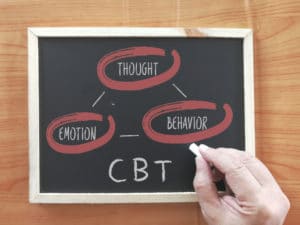 Cognitive-behavioral therapy, or CBT, is an evidence-based form of psychotherapy (‘talk therapy”). Cognitive-behavioral therapy focuses on thoughts, feelings, and behaviors and the reciprocal relationships among the three. Thoughts affect behaviors and feelings, behaviors affect thoughts and feelings, and feelings affect behaviors and thoughts. Altering one will modify another. CBT can help individuals identify their maladaptive thinking patterns and behaviors, and change them. It can also treat a variety of different mental health conditions including anxiety, depression, post-traumatic stress disorder, and substance abuse.
Cognitive-behavioral therapy, or CBT, is an evidence-based form of psychotherapy (‘talk therapy”). Cognitive-behavioral therapy focuses on thoughts, feelings, and behaviors and the reciprocal relationships among the three. Thoughts affect behaviors and feelings, behaviors affect thoughts and feelings, and feelings affect behaviors and thoughts. Altering one will modify another. CBT can help individuals identify their maladaptive thinking patterns and behaviors, and change them. It can also treat a variety of different mental health conditions including anxiety, depression, post-traumatic stress disorder, and substance abuse.
CBT is a short-term, problem-focused, goal-oriented therapy. It requires the individual to actively practice skills outside of therapy to change thinking patterns and behaviors, and reduce symptoms. CBT focuses on resolving current issues, and identifying and altering current thoughts and behaviors. CBT’s primary focus is on the present. If you’re more concerned about your past and the ‘why’ you think and act the way you do, then CBT may not be appropriate.
A trained psychotherapist can help you work on the following CBT techniques:
Setting Treatment Goals
When you begin CBT the therapist will ask you to identify some areas in your life that you would like to change in order to improve your life. For example, you might wish to improve your work or school performance or increase your social circle. To achieve those goals you will need to practice and take action outside the once-weekly 45-minute therapy session. Treatment goals are based on the individual’s needs at the time and can be modified at any time.
Identifying Negative Thoughts
Identifying the effects of negative thoughts on your feelings and behaviors is the first step. It will help you change these thoughts into more positive ones, which will change your feelings and behaviors. For instance, if you’re struggling with social anxiety you may have the feeling that “nobody likes me”. This can make you avoid social situations and isolate yourself from your peers. The therapist will give you worksheets, or activities to practice between sessions, to help identify thinking patterns you may not be fully aware of.
 Identifying Schemas or Core Beliefs
Identifying Schemas or Core Beliefs
Schemas or core beliefs are these beliefs we have about ourselves that we developed earlier in life and which now influence our feelings about ourselves and our behaviors. For instance, if as a child your parents always treated you as a child and never gave you any autonomy, you may believe that you’re “incompetent”. As a result, you now avoid applying for a high-achieving job because you don’t believe you’re capable of achieving your goals.
Self-monitoring
Self-monitoring is a core concept in CBT. It involves tracking your thoughts, feelings, and behaviors in order to identify the patterns in your life that are harmful. For instance, if you’re struggling with an eating disorder, the therapist might ask you to keep track of your feelings and thoughts that happen before, during, and after a binge-eating episode.
Learning and Utilizing New Coping Skills
During treatment, as you begin to identify maladaptive thinking patterns and destructive behaviors, the therapist will give you coping skills to practice outside of therapy to reach your treatment goals. Some CBT coping skills include behavioral activation, relaxation exercises, thought-record form, and pros and cons. In order for these coping skills to work they require practice in real-life situations. The more you practice these skills the easier it will be to use them and the more automatic they will become.
Problem-solving Skills
Altering thinking patterns and behaviors to more positive ones will increase your overall well-being making it easier to face daily challenges and life stressors. CBT has five problem-solving skills. (1) Identify the problem. (2) Prepare a list of solutions. (3) Determine the pros and cons of each solution. (4) Choose the solution you think will be most effective, taking into account the facts and your feelings about the problem. (5) Put the solution into action and resolve the problem.
Contact us today to schedule a complimentary 15-minute phone consultation or to book an appointment.

